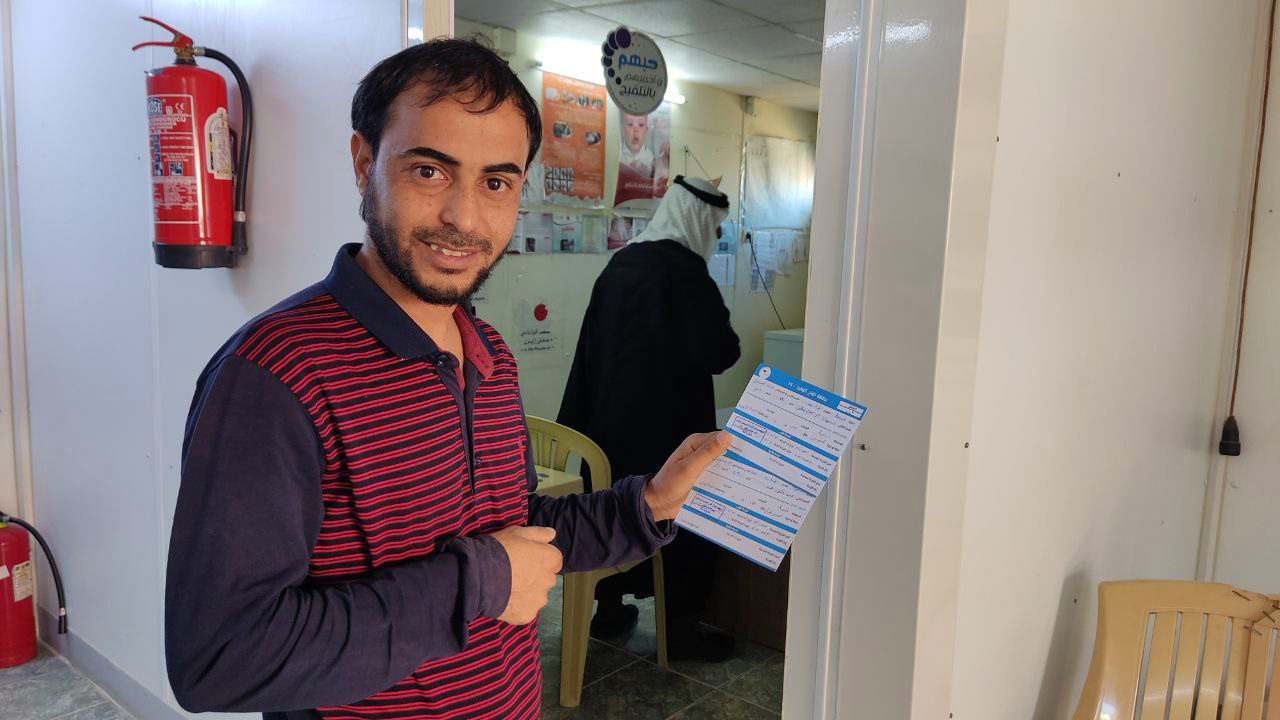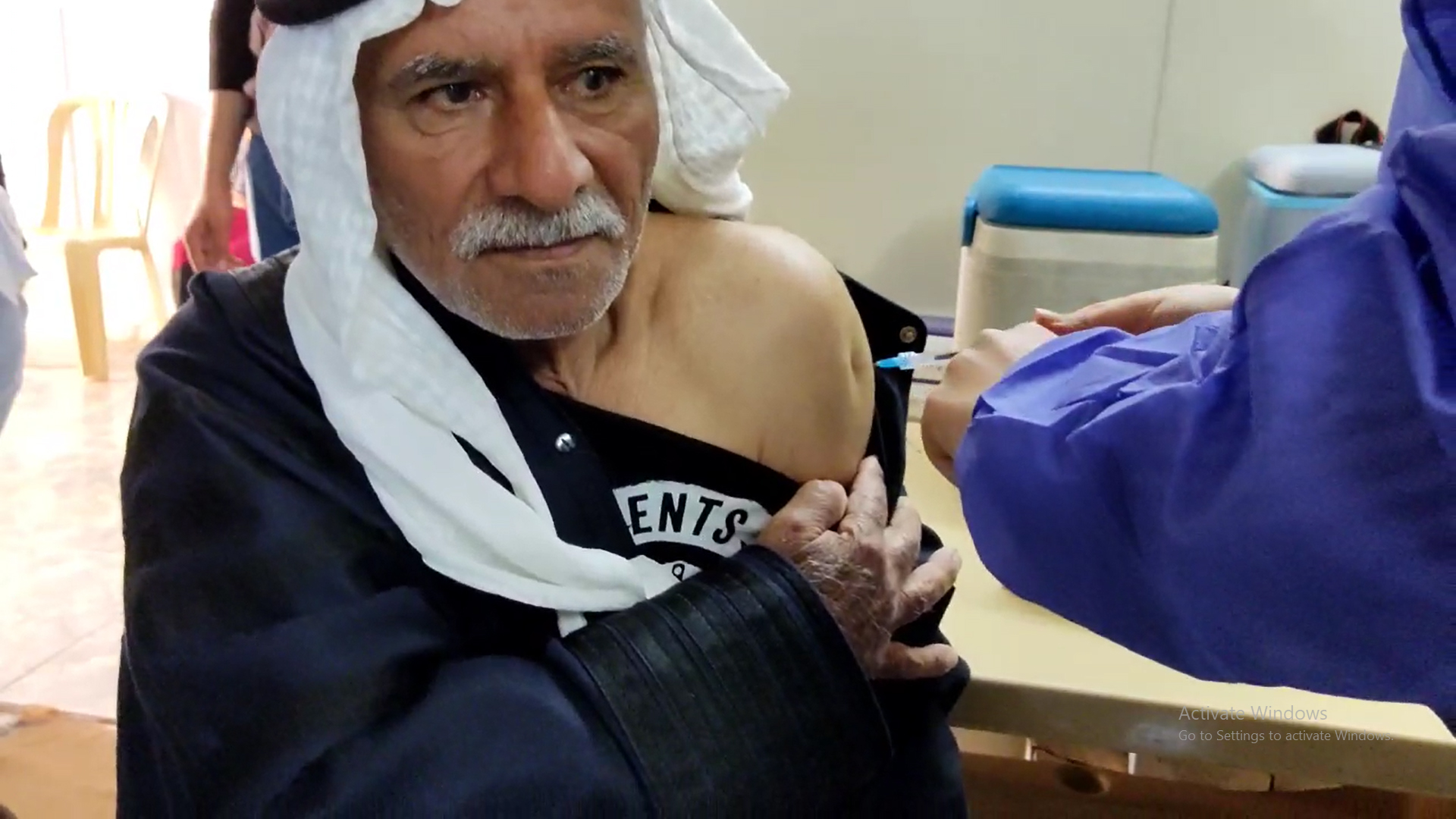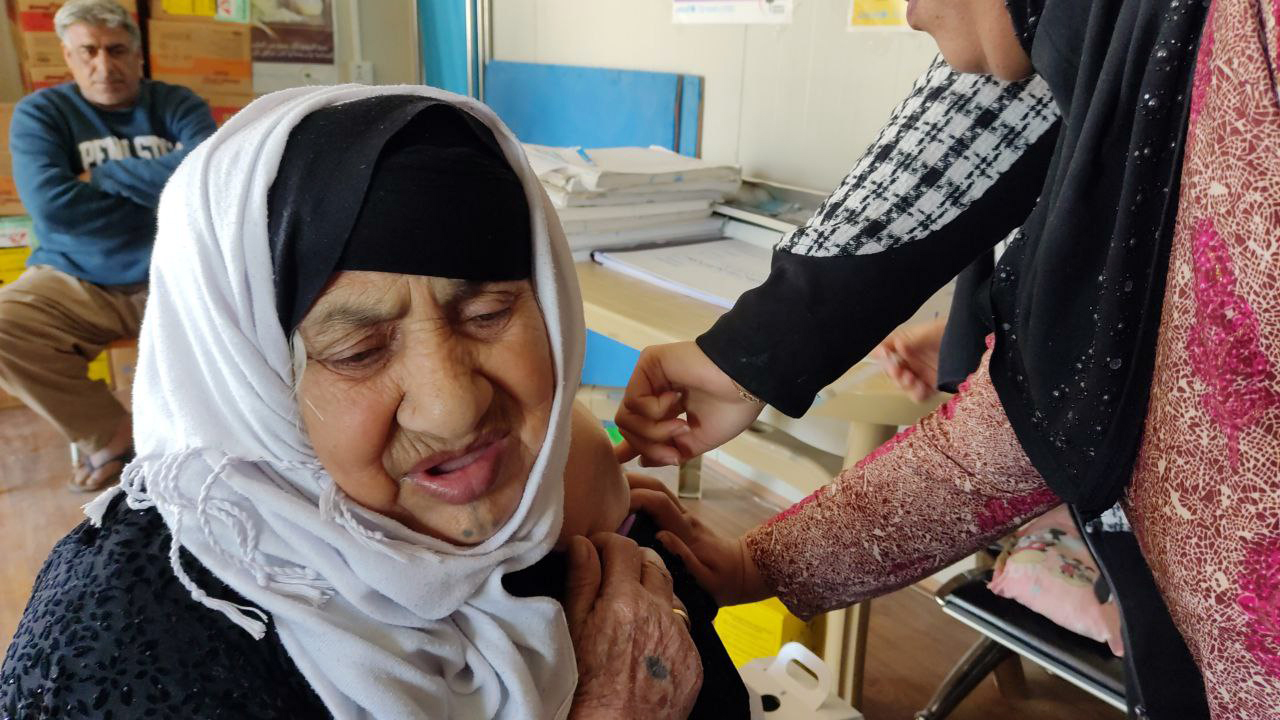Siti Shabab, 63, received the second dose of the Corona vaccine without trouble in a by a mobile medical team, only few meters away from her tent in the camp.
Shabab was displaced from Mosul following take over of the city and large swathes of Iraq by the extremist militants of the Islamic State of Iraq and Syria, and is currently living in Harsham camp for Internally Displaced Persons IDP in Erbil, the capital of the Iraqi Kurdistan Region IKR.
“I trust in God and then this injection that it will protect us,” Shabab said.
Originally Shabab is from Hawdian region near Rawandez district of Erbil province, but their ancestors moved to Mosul and settled there during the monarchy period, a hundred years ago. She was back to Erbil in 2014, but this time as an IDP fled ISIS atrocities.
“Before no one dared to receive the injection, all were afraid to die (because of non-scientific claims that the vaccine will have harmful effects in the future), but now the situation is now very good. I was the first person in my family to receive the vaccine, now all of them are vaccinated," says Shabab, who is constantly urging camp residents to get vaccinated.
To follow up the process of administering vaccines to the displaced, KirkukNow reporter visited the Harsham and Bahraka IDP camps in Erbil, 360 km north of Baghdad, three times at different timings.
Harsham camp is five kilometers from the center of Erbil city. It is located within the Ainkawa district. It is the smallest camp in Erbil in terms of the number of its residents. The camp houses 293 families, consisting of 1,441 people, according to statistics obtained by KirkukNow from the camp manager, Abdul Qadir Sheikh Mohammed.
There are no official statistics about the number of people infected with Covid-19 and deaths from the epidemic in the camp, but according to KirkukNow follow-up, nearly six people died after they were tested positive.

Erbil, February 2022: Alaa Hussein holds a corona vaccination card in his hand after receiving the vaccine in a camp for displaced people. Farman Sadiq
Dina Dilshad Qader, director of the vaccination department at the General Directorate of Health of Erbil, said it has allocated vaccination teams for the ten camps of Erbil (four for refugees and six for IDPs), which are the camps of Bahirka, Harsham, Hassan Sham U2, Hassan Sham U3, Khazar and Dibaga.
vaccination teams allocated for the ten camps of Erbil
These teams were formed in early November 2021 by a decision of the Ministry of Health in the Kurdistan Regional Government KRG in cooperation with the United Nations Children's Fund UNICEF.
So far, 1,334 people have received the first dose of the corona vaccine in the camps for the displaced in Erbil, 843 people have received the second dose, while only 12 people have received the third dose of the vaccine. In Bahraka camp alone, 636 people have received the vaccine, 290 of whom are females and 346 males, Dilshad explained.
5,747 displaced families live in the Erbil camps, about 28,207 people, according to statistics obtained by Kirkuk Now from Aref Abdullah, the camp supervisor, who in turn got it from the Barzani Charity Foundation, out of a total of more than 664,000 IDPs in the IKR, most of whom are Ezidis (Yazidis), Muslim Sunni Arabs and Christians of Nineveh, Anbar, Salah al-Din, Kirkuk and Diyala provinces.
Iraq has joined the jab race last March when it has received a batch of 50,000 of Sinopharm Covid-19 vaccines. Up to March 1st, Iraq has registered about 2.3 million infections resulted in 25,000 deaths while almost ten million have been vaccinated, daily updates by Iraqi ministry of health shows.
Alaa Hussein Ibrahim, 42, has been living for eight years in Bahirka camp, while visiting the medical team inside the camp’s vaccination center to receive the second dose of the Corona vaccine, he told KirkukNow, “It is better for everyone to take the vaccine, the vaccination team is inside the camp, we don't have any trouble getting vaccinated."
Alaa is married and the father of five children.
The vaccination team assigned to each camp consists of six people, five of whom work under temporary contracts.
the vaccination team is inside the camp
“By this we wanted to provide job opportunities for a number of health, information technology (IT) and statistics graduates, there are now 30 people who work under contracts within the vaccination teams and receive their salaries from UNICEF,” according to the head of the vaccination department in the Erbil Health Directorate.
The members of these teams do not work in one camp, but their workplaces are switched. The vaccination team in Harsham camp administers vaccines to the citizens every Tuesday, while in Bahirka camp the vaccines are given on Sundays and Wednesdays.
Video, Erbil, February 2020: Siti Shabab, a displaced woman residing in Harsham camp in Erbil, receive the second dose of the Corona vaccine.
“No one from the Iraqi government came to the camp in Bahirka to give vaccines to the displaced, we do not know why they did not come. They visited the camp several times in the past and gave some promises, but they did not implement any it, even the process of distributing supplies, food and financial aid is suspended,” Hussein added.
958 families, totaling up to 4,650 people, live in Bahraka camp, 10 kilometers from the city center of Erbil, 200 families are from Mosul, 50 families from Shingal (Sinjar) and the rest are displaced from the areas of Baaj of Nineveh province, Salah al-Din and Anbar.
KirkukNow was not able to obtain an official statistic about the number of cases and deaths due to the Corona virus in Bahirka camp.
However, Alva Iyad Ali, the supervisor of the Bahiraka IDP camp, appointed by Barzani Charity Foundation which oversees the management of the camps in Erbil, said two people died in the camp as a result of infection with the Corona virus.
The camp residents confirmed that and indicated that more than 140 cases of corona infection were recorded in the camp.
Dr. Karez Namiq, from the Health Division of the Barzani Foundation said they have started conducting tests to detect corona in the Khazar, Hassan Sham U2 and Hassan Sham U3 camps since November.
45 cases were recorded in November, 163 in December and 93 in January in those camps, but no deaths from the virus were recorded in those three months, Namiq added.
Namiq says that tests to detect corona are not conducted in other large camps because they are close to health centers in the city, and they can conduct examinations in those centers.

The federal government is sending additional quantities of Corona vaccine doses to the IKR to ensure that all displaced people receive the vaccine.
A spokesman for the Iraqi Ministry of Migration and Displacement, Ali Abbas Jahangir, said, "The distribution of vaccine doses to the camps located within the administration of the Kurdistan Region came at our request to the Iraqi Ministry of Health," yet he has not displayed any data or numbers.
Jahangir indicated that they will soon begin distributing financial aid and food to the displaced, after its suspension sparked a wave of protests.
"Stopping the aid distribution is related to reorganizing the financial affairs for the new year. Currently, the technical committee is in the process of completing preparations for delivering aid to the displaced within the next two weeks."
In the Kurdistan Region, there are 26 camps for the displaced, and a large number of the displaced reside outside the camps in the cities and districts of the governorates of Erbil, Sulaymaniyah and Dohuk.
The Director of the Vaccination Department in the Erbil Health Directorate stated that, according to an agreement with UNICEF, the vaccination teams will continue to work in the camps until mid-April “based on the available statistics, the number of beneficiaries and people who need to receive the vaccine, as well as the number of people who received the first and second doses."





